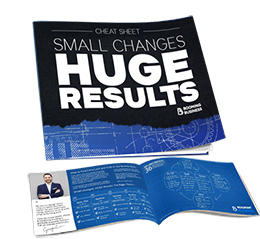One of the biggest things that separate a good business from a GREAT business, is Superstar team members. Here’s how to identify them in an interview…
FREE Cheat Sheet: 43 Killer Interview Questions
How to Identify Superstar Team Members in an Interview
This is a topic that constantly comes up in my high end mastermind groups and is vitally important to get right.
In fact, most businesses I see are often only one or two great, strategic hires away from a major breakthrough and I’d wager that your business is the same.
Know That There’s a Broader System…
Now in full disclosure, all my clients use a process I created called “The Recruitment Relay System,” to help them find and hire top performing, self reliant, A-grade team members… Without the usual gamble, headaches and uncertainties that are inherent when recruiting new people.
Superstars Rarely Show Up Randomly
This system has been used to recruit more than a thousand people over the years, and the reason I share that with you, is to stress the point that Superstars team members very rarely show up randomly.
They Show Up By Design.
That being said, whether you’ve got a system like that or not, the key is being able to identify Superstars when they’re sitting down in front of you.
Here’s What to Look For…
#1 Do Their Values Align?
One of the first things you should look at is, do their values align with yours (and yours should already be aligned to the business)?
This is critical.
Somebody may have been a Superstar in a previous role or different environment. However, if their values don’t align with yours, then it’s very unlikely that they’re going to perform in your environment.
To be clear, I’m not referring to the typical, fluffy, nonsense “values” you often see posted on a wall somewhere.
I’m talking about the deep down attributes that you hold to be dear. The ones that make you tick and influence everything you do.
Remember that you are entering into a relationship with anyone you hire.
Just like any other relationship, the ones that are good, strong and happy – the ones where people act, behave and perform at their best, are first and foremost grounded on similar values.
A great exercise to do in every interview, is to get people to list and rank their top five values and then have a discussion.
How similar are they to yours?
Ask why they listed and ranked them the way they did. Ask if they left anything out.
Taking the time to be clear on your own values and ensuring there’s an alignment upfront, will save you a tremendous amount of time, effort and productivity down the track.
#2 Have They Previously Been Trusted With Responsibility?
The next thing you should be looking for, is whether they have consistently been given more responsibility than what their job entails.
If so, how did they handle it?
Alternatively, have they actively sought additional responsibility out for themselves?
- Have they joined any charities or external organisations?
- Have they sought out projects, roles or initiatives that entail leadership or other positions of responsibility?
This can potentially be a great demonstration of ongoing capability and is a good sign that they will be keen and willing to take on additional responsibility in your organisation.
#3 Do They Take Ownership or Do They Blame?
Another key trait to look out for, is whether this person takes ownership for themselves vs. blaming other people, situations and circumstances when they’re talking about their challenges and mistakes.
Ultimately, what you want to do here is find out how self aware a candidate is.
I’ve found the more self aware someone is, the more likely they are to grow and develop.
If they’re not very self aware, they’re likely to continue to blame external factors, make excuses and cause problems in your team.
A great question I always like to ask in this space is, “what was unfair about your last job?” Then simply listen to what they have to say.
#4 Are They Committed to Continuous, Ongoing Learning?
The next thing to look out for is, can this person demonstrate that they are committed to continuous and ongoing learning?
If they are, then they’re very likely going to continue to grow and prosper in your organisation.
Always ask these three things:
- What are you currently listening to or reading?
- What training, development or education have you done in the last 6 months that wasn’t mandated by your employer? Bonus points if they paid for it themselves or took leave to attend.
- What specifically are you learning in the next 6-12 months and how will you go about doing it?
This will give you a great indication as to whether they take learning seriously or if it’s simply lip service for the interview.
#5 Can They Demonstrate That They Take Initiative?
Finally, can they demonstrate that they are self motivated and take initiative?
The Recruitment Relay System has built in mechanisms to help you identify this, but you should be asking questions that elicit them to share stories, experiences and past examples.
Be sure that you also do activities to put people “on the spot” or that forces them outside their comfort zone. You want to do this, purely to see how they react and respond under pressure.
It can be eye opening and you’ll often be surprised by people’s behaviour when they are forced out of any pre-rehearsed or practised interview “script.”
I’ve seen brilliant candidates crumble and weaker ones shine.
It’s vitally important to do this, because if your business is growing, changing quickly or looking to do great things, then circumstances will often put your team members under pressure as well as push them well outside their comfort zone.
Better to know how someone reacts to this upfront.
Don’t neglect this point.
Next Steps…
So as you’ve probably realised, the key to identifying potential Superstars in an interview, is the ability to ask good, probing questions.
The secret however, is not actually in the initial question that you ask…
Rather, it’s in your follow up questions which are based on the specific answers that you receive.
That’s where you find the gold.
FREE Cheat Sheet: 43 Killer Interview Questions



